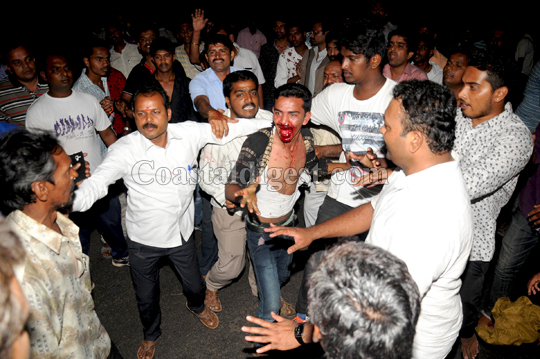Mysuru, Mar 14: The Bharatiya Janata Party and other Hindutva groups are trying to impose a forceful bandh in Mysuru on Monday in protest against the death of a BJP worker in a clash on Sunday.
Raju (30), an electrical contractor, was murdered at Lal Bahadur Shastry Circle on M?G?Road under Udayagiri police station limits by a gang of three persons. The incident triggered tension in parts of the city.
It is said that Raju, along with his friend Jayakumar, was drinking tea at a roadside shop, when three bike-borne people arrived and attacked Raju with lethal weapons, before fleeing from the spot. Raju, who sustained severe injuries on his face and ears, died on the spot.
According to police, Raju, a resident of Kyatamaranahalli in the city, had left home on Sunday morning to meet his friends. Following the incident, a large crowd had gathered in front of the K R?Hospital mortuary demanding police to arrest the accused immediately.
As news of the murder spread, a large number of party supporters and workers gathered at the K.R. Hospital mortuary, resulting in tension for some time. Commissioner of Police B. Dayananda rushed to the spot and there were arguments between the police the party supporters.
A few people in the crowd also tried to gherao Police Commissioner. Security has been tightened near the mortuary.
Meanwhile, condemning the murder, BJP state unit president Pralhad Joshi said the BJP would support the Mysuru city bandh called on Monday. Accusing the police of failure to prevent such an incident, he demanded that the culprits be arrested at the earliest.

People help a person injured in Sunday's group clash in Mysuru





Comments
wow superb comment rakesh ... love it.... shaan and zain ... he used that language on pro-pakistani and anti india terrorists ... not others ... why do u worry , if you are not . jai sangh parivar ..RIP brother raju ... it is already proved as mr raju opposed madrasa as it was into anti indiaactivities)so they have killed him...
Rakesh mind your language, without any proof don't blame. Might that communal minded killed by your own people because of temple issue. UAE you don't know how to talk, idiot fellow....
Rakesh,
Your barking language reflects your culture which was trained you by Notorious Sanga Parivar criminals. Even you have been working in UAE. well cultured country still did not learn good culture from UAE residents.
How did you all comment that it is pro Pakistanis or SDPI or Congress people killed him???? without knowing anything.
Please wait for Police enquiry, may the murder due to old rivalry, or may be his own relatives for land or property clash, or love affairs involved...??????
bastards, pro pakistani community which is loyal to cult in middle east killed innocent raju ... we will make sure they will pay for this ....RIP Raju .congress regime , no safety for hindus ..
SDPI plan to lure vote bank,
BJP/Congress simply normal people are bleeding and politicians are gaining, when this people will understand god only knows it.
uppu thindavanu neeru kudile beku...
Add new comment